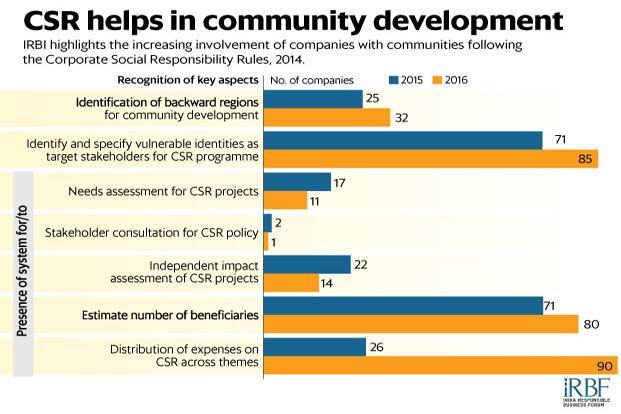While CSR rules of 2014 have had a positive impact on company ratings in IRBI 2016, they are no substitute for responsible business practices, say experts.
To gauge the extent of engagement that Indian companies have with the communities around them, non-profit organizations Oxfam India, Corporate Responsibility Watch, Praxis and Partners in Change collaborated on an index—the India Responsible Business Index (IRBI), now in its second edition.
The collaborative effort is aimed at promoting discussions and debates around the non-financial processes of businesses to encourage responsible business practices.
While corporate social responsibility (CSR) rules of 2014—which direct certain firms to spend 2% of their average profits on social development projects—have had a positive impact on company ratings in IRBI 2016, they are no substitute for responsible business practices, say experts.
The index shows the number of companies looking at backward regions and communities to conduct CSR activities has risen from 25 in 2015 to 32 in 2016 and that of companies identifying vulnerable communities to work with has increased from 71 in 2015 to 85 in 2016.
According to Shamika Ravi, senior fellow at Brookings India, the CSR law reflects the needs of Indian society but is not the same as responsible business.
“This legislation is needed because the market has failed to address a number of social challenges,” she says. “We need mechanisms to address social objectives and not just the money spent.”
Pradeep Narayanan, director of Partners in Change, says that responsible business has to be part of the business process “right from the point of procuring raw materials, acquiring land, setting up manufacturing or business operations to mitigating any adverse impact that such a process might have on society and environment”.
Narayanan suggests that responsible business practices are better defined in the nine principles of the national voluntary guidelines drafted by the ministry of corporate affairs in 2012.
There are a few companies that subscribe to the school of thought that responsible business goes beyond spending 2% of profits on social development.
A. Sudhakar, head (global human capital and CSR) at Dabur India Ltd, says, “CSR as a law is limited to the community outside the four walls of the business and its processes. But as a concept, it goes beyond to include society and the world at large.”
This belief in the wider definition of CSR is what necessitated Dabur’s need-assessment surveys before starting a CSR project, he adds.
This article was taken from here.

